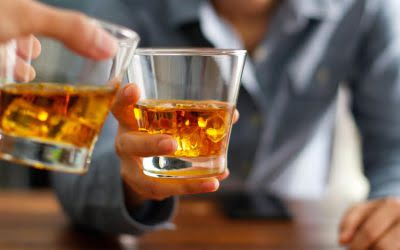High alcohol consumption also increased heart rate from 7 to 12 hours and after 13 hours. Most of the evidence from this review is relevant to healthy males, as these trials included small numbers of women (126 females compared to 638 males). We classified seven studies as having high risk of bias (Agewall 2000; Bau 2011; Dumont 2010; Fazio 2004; Karatzi 2013; Maufrais 2017; Van De Borne 1997). Agewall 2000 measured blood pressure upon arrival of participants and did not measure blood pressure after the intervention. The aim of Bau 2011 was to determine the effects of alcohol on heart rate variability, so SBP was not measured in this study.

Alcohol increases the risk of several other short- and long-term health issues. Alcohol prevents the body’s baroreceptors from detecting a need to stretch the blood vessels and increase their diameter, causing an increase in blood pressure. When blood pressure decreases, these receptors help minimize how much the blood vessels stretch to increase blood pressure. Similarly, when blood pressure increases, these receptors increase the stretching of the blood vessel walls in order to decrease blood pressure.
Rossinen 1997 published data only
The UK Chief Medical Officers’ (CMO) low risk drinking guidelines advise that people should not regularly drink more than more than 14 units a week to keep health risks from alcohol low. If you do choose to drink, it is best to spread your drinks throughout the week. Drinking alcohol increases blood pressure and repeated drinking https://ecosoberhouse.com/ causes sustained high blood pressure. Additionally, doses of over 240 mL were also able to reduce diastolic blood pressure. Diastolic blood pressure is the pressure in the arteries between heartbeats. A study from 2019 looked into the effects of aged white wine consumption in males with a high risk of cardiovascular disease.
Alcohol Intake and Blood Pressure Levels: A Dose-Response Meta-Analysis of Nonexperimental Cohort Studies – AHA Journals
Alcohol Intake and Blood Pressure Levels: A Dose-Response Meta-Analysis of Nonexperimental Cohort Studies.
Posted: Mon, 31 Jul 2023 07:00:00 GMT [source]
We classified nine studies as having high risk of bias (Agewall 2000; Bau 2011; Buckman 2015; Dumont 2010; Fazio 2004; Karatzi 2013; Maufrais 2017; Rossinen 1997; Van De Borne 1997). Agewall 2000 measured blood pressure upon participants’ arrival and did not measure blood pressure after the intervention. The aim of Bau 2011 was to determine the effects of alcohol on heart rate variability, so study authors did not measure and report DBP. For Buckman 2015, blood pressure was recorded beat to beat continuously, but DBP was not reported. Dumont 2010 measured blood pressure during the RCT, but study authors did not provide the before and after measurement of DBP.
Brown 1981 published data only
It is a common substance of abuse and its use can lead to more than 200 disorders including hypertension. This review aimed to quantify the acute effects of different doses of alcohol over time on blood pressure and heart rate in an adult population. 3Greenfield and colleagues (2005) studied the effects of alcohol at meal time in a group of nonsmoking, healthy postmenopausal women. Each woman was given either no alcohol or 15 g of alcohol (1 standard drink) with either a low-carbohydrate or a high-carbohydrate, high-fat meal.

We (ST and CT) assessed the risk of bias of included studies independently using the Cochrane risk of bias tool (version 1) according to Chapter 8 of the Cochrane Handbook for Systematic Reviews of Interventions for the following domains (Higgins 2011). Two review authors (ST and CT) independently extracted data and assessed the quality of included studies. Mean difference (MD) from placebo with 95% confidence interval (CI) was the outcome measure, and a fixed‐effect model was used to combine effect sizes across studies.
Durocher 2011 published data only
The aim of Fazio 2004 was to determine effects of alcohol on blood flow volume and velocity. Study authors mentioned that acute ethanol administration caused transitory increase in BP at 20 minutes. Rossinen 1997 measured blood pressure but selectively reported only SBP instead of reporting both SBP and DBP. Karatzi 2013Maufrais 2017 and Van De Borne 1997 measured blood pressure before and after treatment but did not report these measurements. One common risk factor for CV disease is the composition of the lipids found in the blood, and the effects of alcohol consumption on lipid profiles have been extensively studied. Many researchers have found that alcohol intake increases HDL cholesterol (HDL-c) levels, HDL (“good cholesterol”) particle concentration, apolipoprotein A-I, and HDL-c subfractions (Gardner et al. 2000; Muth et al. 2010; Vu et al. 2016).

The remaining seven studies reported the method of randomisation used, hence we classified them as having low risk of bias. It is important to note that information regarding to the method of randomisation used in Foppa 2002 and Rosito 1999 was provided by the study author via email. Both reviewers (ST and CT) rated the certainty of evidence independently by examining how does alcohol affect blood pressure risk of bias, indirectness, inconsistency, imprecision, and publication bias. Both review authors (ST and CT) rated the certainty of evidence independently by examining risk of bias, indirectness, inconsistency, imprecision, and publication bias. It is recommended that there should be at least 10 studies reporting each of the subgroups in question (Deeks 2011).


Leave a Reply